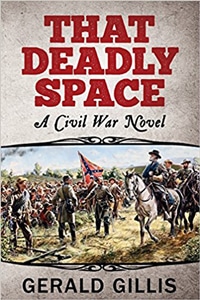The third (and last) excerpt from my Civil War novel That Deadly Space.
On Tuesday, October 18, the Confederates broke camp and moved out after dark. They followed a narrow path between the Shenandoah River and the northern tip of Massanutten Mountain. They could move only in a single-file formation for long stretches, and thus could take no artillery with them. They met up with Masterson’s other divisions in the heavy fog and attacked the Federals in their campsite, achieving total surprise. Conor’s regiment led the attack from General Gordon’s Division, and they found many of the Yankee soldiers still half-dressed when they came out to meet their attackers. The Federal troops made a fighting withdrawal, but the Rebels won the field.
By 10:00 am, the Southerners had once again achieved what appeared to be a stunning victory.
The hungry troops stopped only briefly to pillage the Union supplies for all they could find. They had collected 1,300 prisoners and 24 cannons, but inexplicably the order to halt came just as they were readying to press the final assault. Conor immediately thought of the first day at Gettysburg where the order to halt had cost them dearly, and when he saw General Gordon ride into his position he, too, seemed perplexed.
“Why are we halting, sir?”
“Orders from General Masterson. I’m on my way to see him to discuss the matter. I want you to have your regiment ready to resume the attack, but in the meantime you are to halt in place. Do you understand?”
“Understood. We are halted, General.”
First Sergeant Tanneyhill came forward and handed Conor a biscuit and some bacon. “It’s still warm,” he said as he licked his fingers from his own unexpected but nonetheless much appreciated Yankee-style breakfast.
“We’re halting again at exactly the wrong time,” Conor said in disgust. “Courtesy of General Masterson.”
“Can General Gordon change his mind?”
“I doubt it. Just between us, General Masterson’s nothing but a hollow uniform. If you tapped him on the shoulder you’d probably hear an echo. And arguing with him is like picking up a dog with bowel complaint. It’s usually best just to leave it be.”
Tanneyhill laughed. “Why do you suppose General Masterson’s like that?”
Conor sighed. “That’s just who he is. The reason a skunk’s a skunk is because he has no sense of refinement. In the general’s case, he has no sense of battlefield refinement, so he panics and orders us to stop. It’s become a habit he can’t seem to break. Whenever he sees us about to become victorious, he slams the door shut and halts us in place. It’s like he’s satisfied with partial victory. I’m going to start referring to him as General Partial Victory Masterson. How do you like that, First Sergeant? Ole P.V. Masterson has halted us again. What a surprise.”
“You might want to lower your voice, sir.”
“Yessir, ole P.V.’s gonna get us in position to partially win this damn war. And then he can go back to his partial home with his partial family and find some partial job and live the good partial life. And when he grows old he’ll probably figure out a way to partially die.”
“Sir, my advice to you is to lower your voice.”
“Okay, I’ll split the difference with you and partially lower my voice. Besides, what’s ole P.V. gonna do about it if he hears me? Order me to pack my gear and send my insubordinate ass to the Shenandoah as punishment? Well guess what? It appears he’s already done that.”
Conor then turned his attention to the food and consumed it in two large bites. When a lieutenant courier showed up on horseback and told him to halt his regiment in place, per General Masterson’s orders, Conor began gesturing and cursing so vehemently with a mouth so overstuffed that white bits of biscuit were sent flying.
The lieutenant could see Conor’s red-faced agitation but could understand nothing that was being said.
“He’s aware of that order, sir,” Tanneyhill calmly told the courier who immediately turned about and galloped away, but not without looking back.
“What’s the matter with finishing what we started?” Conor said to no one in particular. “Have we lost our nerve in partial victory as well as defeat?”
Tanneyhill stepped beside Conor, put his hand on his shoulder, and said in a calm, measured tone, “Easy does it, sir. This regiment doesn’t need you serving time in a military brig for insubordination. It needs you out here in command. You’ve made your point, so let it be. Please, sir, no more.”
Conor took in a deep breath and let the matter pass. After a few minutes he was greatly ashamed at his lack of maturity, and he thanked Tanneyhill for the abundance of his.
The Confederates pressed forward, but only after several hours had passed. The Federals resisted stiffly and the Rebels withdrew without much of a determined attack. The main Federal counterattack came at about 4:00 pm, with Sheridan’s cavalry attacking the Confederate flanks and his divisions pressing against the Reb center. For an hour, both armies battled furiously north of Middletown, but then Masterson’s left flank began to crumble and Union cavalry suddenly appeared in the rear of the Confederates. More of the gray army collapsed when the men realized that the Federal cavalry might block their path to Cedar Creek, their only avenue of escape. Rebel artillery delayed the Union advance, but only for a short interval. To make matters worse, a small bridge on the Valley Pike collapsed and made it impossible for the Confederates to cross a creek south of Strasburg with their wagons, including the captured artillery. Thus, they had no choice but to abandon the guns and the wagons.
As the retreat was underway, Conor noticed a Confederate major on horseback, from General Masterson’s staff, frantically waving his sabre at a group of Conor’s soldiers. The officer was threatening to slash a frightened private when Conor rushed to confront the major.
“Put that sabre away, you damned fool,” Conor shouted. “If you can’t use it on the Yankees, then give it to someone who will.”
“These men are cowards,” the major shouted in return. “They should be punished. General Masterson will be interested to know how your troops behaved in battle today, sir.”
“Then go back and tell General Masterson to punish all of us since it’s his entire army being routed from the field. What does that tell you about his leadership?”
“It’s not his leadership, sir. It’s a failure of execution on your part. What would that tell him about you?”
“General Masterson and his entire staff, including you, you dandy pompous ass, should be relieved of duty twice—once for incompetence and another for being too damn dense to know it.”
“You are very badly mistaken, sir.”
“No, sadly, I am not mistaken. And let me add one other thing: You threaten another of my men on this or any other battlefield and I will personally blow a very large hole in that thick but otherwise empty skull of yours. Now get the hell out of my sight. Go!”
The officer stared at Conor, but made no move. Conor quickly drew and cocked his pistol and then took aim. The wide-eyed major spurred his horse and sped away. First Sergeant Tanneyhill, who had observed the entire scene, shook his head but remained silent.



